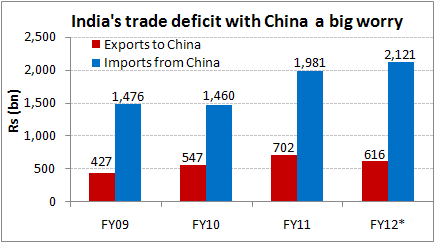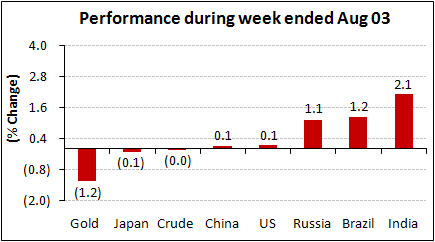Will India learn from this biggest banking scandal?
In this issue:
» India's widening trade deficit with China
» This shows our heavy dependence on diesel
» Does India really need a sovereign wealth fund?
» Did you know this shocking secret about the US Fed?
» ...and more!
-------------------------- Asad Dossani's Secret "Wealth Radar System" Revealed! --------------------------

|
-------------------------------------------------------------------
00:00 |
 |
|
But this is too trivial compared to what we are just going to tell you about. Imagine a cartel of big global banks manipulating the global financial system. We are referring to the Libor banking scandal. For a lay Indian, this may not be quite a popular term. But in the global financial system, it is a very crucial pivot. For starters, Libor stands for London interbank offered rate, the rate at which banks think they can lend and borrow money themselves. Libor is a globally accepted benchmark interest rate for over US$ 350 trillion in financial products.
Regulators are said to be of the view that the manipulation of the Libor interest rate was the result of "organised fraud". As per news agency Thomson Reuters, Barclays paid a hefty fine of about US$ 453 m to authorities in the US and the UK to settle allegations that some of its traders had colluded with employees at other banks to manipulate Libor. Several other financial institutions are reportedly under the scanner of regulators for their alleged role in the fraud. This comes as another striking evidence of the threat big banks and financial institutions pose to the health of the global economy. But they are not the only ones to be blamed. Such scandals also reflect the negligence of the regulators. What were they doing all this while? Worse still, these are the same too-big-to-fail institutions that the central banks rescue in times of crisis.
What lessons does this financial scandal have for India? It must be noted that in 1998, the Mumbai inter-bank offer rate, referred to as Mibor, was set up on the lines of Libor. The Mibor acts as a benchmark rate for all interest rate swaps, forward rate agreements, floating rate debentures and term deposits. Though most key interest rates in India are benchmarked by the Reserve Bank of India (RBI), the Libor scandal may be a reminder for the Indian central bank to ensure adequate checks and balances to ensure that a similar fraud does not occur in India. Already discussions are underway to switch to an actual screen-based traded price of Mibor as the current system could be susceptible to manipulation. We really hope the Indian bank regulator and the banks initiate appropriate steps to avoid a similar disaster in our country.
Do you think the Indian bank regulator is vigilant enough to avoid a Libor scandal in India? Share your views or you can also comment on Facebook page / Google+ page.
01:30 |
Chart of the day | |

|
| Data source: Ministry of Commerce & Industry, Department of Commerce
*April to December 2012 |
01:52 |
 |
|
The state refiners are forced to sell diesel at subsidized rates in the domestic market. On the other hand, private refiners export most of their output due to the tax implications of selling it in domestic market. Therefore, in case of a huge surge in demand, the government would have to seriously think of how it would meet the needs. It would have two options. One would be to import the fuel, which in turn would lead to a rise in the import bill. This is obviously not a preferred route. Or else the government would have to rationalize its tax and subsidy structure. But will it actually do so?
02:50 |
 |
|
Well, for one, our policy makers are keen to have such a fund. Even if that means pulling out Rs 10 bn from budgetary resources. But that very idea reeks of imprudence! Most obviously, India does not have a large amount of money from natural resources that it needs to invest. Nor does it have a sustained current account surplus, such as China runs. The budget deficits are everyone's knowledge. The RBI is opposed to the idea of using India's falling forex reserves for capital investments. And rightly so. It has therefore been suggested that alternatively the government would raise money from the market. Or use surplus cash lying with public-sector units. With our government already having destroyed enough investor and tax payers' wealth, this could be the last nail in the coffin!
03:35 |
 |
|
04:10 |
 |
|
The optimism in the global markets rubbed off on India as well. The Indian equity markets ended the week on a positive note with gains of 2.1%. Markets welcomed the Statutory Liquidity Ratio (SLR) cut by Reserve Bank of India (RBI) during the week. While the key rates were left unchanged SLR was cut to 23%. SLR cut will inject approximately Rs 620 bn of liquidity into the system. However, worries with respect to delayed monsoon and high inflation continued to plague the markets.
Amongst the other markets, Brazil was up 1.2% while Singapore was up 1.8% during the week. UK was the highest gainer having registered gains of 2.8% while Germany was up 2.7% at the end of the week.

|
| Data Source: Yahoo Finance |
04:50 |
Weekend investing mantra |
Today's Premium Edition.
Recent Articles
- All Good Things Come to an End... April 8, 2020
- Why your favourite e-letter won't reach you every week day.
- A Safe Stock to Lockdown Now April 2, 2020
- The market crashc has made strong, established brands attractive. Here's a stock to make the most of this opportunity...
- Sorry Warren Buffett, I'm Following This Man Instead of You in 2020 March 30, 2020
- This man warned of an impending market correction while everyone else was celebrating the renewed optimism in early 2020...
- China Had Its Brawn. It's Time for India's Brain March 23, 2020
- The post coronavirus economic boom won't be led by China.
Equitymaster requests your view! Post a comment on "Will India learn from this biggest banking scandal?". Click here!
4 Responses to "Will India learn from this biggest banking scandal?"
Abhay Dixit
Aug 5, 2012
The trade deficit with china is even bigger if you factor in under invoicing by Chinese. My estimate is 50%-60% under invoicing.
shomesuvra
Aug 4, 2012The LIBOR scandal might have caused the misperception of risk and mispricing of liquidity in money market which are indicated by the spread between LIBOR and overnight indexed swap rate.
shekhar
Aug 4, 2012As of now MIBOR is probably not vulnerable; thats because as the 5 Minute Wrapup has pointed out the bank rates are largely influenced if not actually set by the RBI. However I think the real danger to the depositors wealth is in the crony capitalism indulged in by all banks and dfis - nationalized or private. Already we have seen what happens when this happens in the cooperative banks - I think its just a matter of time before it happens in some of the so called "bigger and scheduled" banks. A few exceptions to this may be HDFC Bank, Yes Bank and Kotak who are known to have robust mechanisms to evaluate lending proposals and monitor potential NPAs.


NVS
Aug 9, 2012The indian banking is dominated by PSU Banks and there is no bonus culture as in West to manipulate for profit. Further unlike western financial system where regulation was loose, in India so far RBI has maintained tight regulation. so immediate danger of manipulation of rates by major banks acting in concert is not there, we can still learn from the LIBOR scandal and ensure against such frauds here.